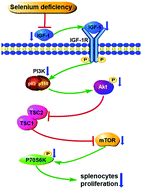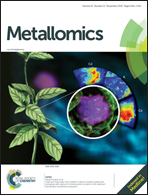Selenium deficiency induces splenic growth retardation by deactivating the IGF-1R/PI3K/Akt/mTOR pathway†
Abstract
Selenium (Se) deficiency impairs the development and function of immune system in human beings and animals. We investigated the effect and molecular mechanism of Se deficiency on spleen development in chicken. The concentration of Se in blood and spleen, the spleen weight and splenocyte number, the histological characteristics of spleen, the concentration of growth factors in serum, the transcription level of growth factor receptor gene and the activity of growth and proliferation pathway in spleen were investigated. We found that the growth of the spleen and the splenocyte number were significantly lower in the chicken fed with Se-deficient diet for 21 and 35 days. The ELISA and qRT-PCR results showed that the serum IGF-I concentration and the transcription level of IGF1R gene in spleen were significantly lower in the SD group. The Western blotting and immunohistochemistry results showed that Se deficiency could deactivate the PI3K/Akt/mTOR pathway in spleen. In summary, the results indicated that Se deficiency decreases the growth rate of spleen and the number of splenic lymphocytes by deactivating the IGF-1R/PI3K/Akt/mTOR pathway.



 Please wait while we load your content...
Please wait while we load your content...